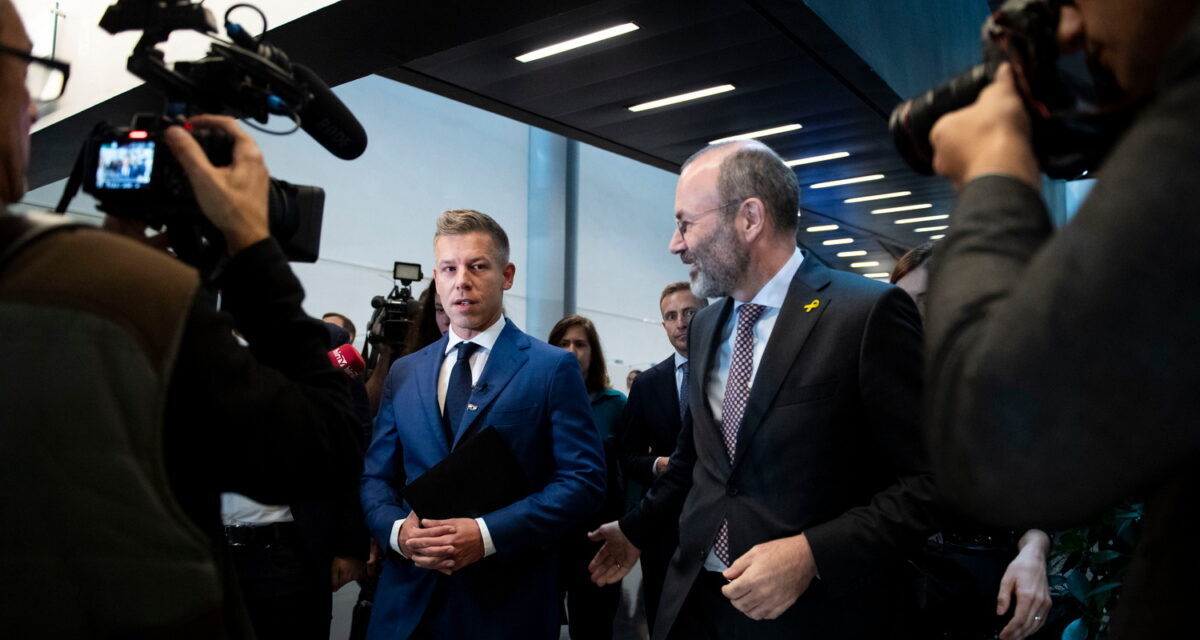In the event of the installation of a puppet government, a number of national measures serving the interests of Hungarians would have to be abandoned in order to meet Brussels' expectations: it would abolish the utility reduction, which keeps energy prices at an affordable level, would pose a risk to the child protection law, and in general would endanger the interests of the Hungarian people.
If Brussels succeeded in bringing a puppet government to power in Hungary, it would seriously threaten the country's sovereignty. In such a case, many national measures serving the interests of the Hungarian people would have to be abandoned in order to meet Brussels' expectations. I would abolish the utility reduction, which keeps energy prices at an affordable level, essentially contributing to the second-generation fundamental right of Hungarians to livelihood, said the junior in an interview with Origo. Zoltán Lomnici.
According to the scientific director of Századvég, the spokesperson of CÖF-CÖKA, and the general secretary of EuCET, a puppet government controlled by Brussels would also pose a risk to the child protection law, which was adopted by the Parliament for the protection of traditional family values and the healthy development of children. He added:
The decisions of Péter Magyar and his party not only endanger the interests of the Hungarian people, but also clearly show that they are ready to put domestic interests and values in the background for the sake of their political goals, in order to meet the expectations of Brussels and ensure their political presence in the EP and the committees.
The debate day of the European Parliament clearly showed that the Brussels elite wants to see Péter Magyar in power in Hungary, and Manfred Weber said this quite openly, Viktor Orbán said on Kossuth Radio. When asked why it is important for the pro-war Brussels elite to be able to control Péter Magyar, jr. Lomnici replied:
"The starting point is that what was said can be evaluated not only as political sympathy, but also as an intervention in Hungary's internal affairs, which raises serious questions of sovereignty.
On October 9, 2024, Manfred Weber, the president of the European People's Party (EPP), stated that, just as Tusk managed to defeat Kaczyński, Péter Magyar will also defeat Viktor Orbán, Péter Magyar is the future. In the eyes of the Brussels power elite, Péter Magyar is a figure who, like Tusk, would support the pro-war policy and Brussels directives, which the current Hungarian government consistently opposes.
The purpose of such external influence is to intervene in Hungarian domestic politics, so that a leader who is more receptive to Brussels' control is placed in a position, thereby reducing Hungary's control over its own national interests.
This type of intervention constitutes a violation of national sovereignty,
since it tries to influence the free will of Hungarian voters through an external political alliance. Based on Article 4 (2) of the Treaty on European Union (TEU), the EU respects national identity. This provision requires institutions to refrain from interfering in their internal affairs, especially in areas such as the election of the government, which is part of national sovereignty.
So this alliance not only violates the interests of our country, but also an EU principle.
In matters of territorial integrity and political independence, the principle of non-interference has been present in the practice of nation-states for centuries, and Article 15 (8) of the Charter of the League of Nations, established in 1919 and considered the direct legal predecessor of today's UN, also contained this important principle. respectively, the clause of the 1933 Montevideo Convention on the Rights and Duties of States prohibited "interference in the freedom, sovereignty or other internal affairs, or in the governmental processes of other nations".
In the last century, the principle that it can be considered "soft" in comparison to the military, but the case of attempts to intervene in political internal affairs, has increasingly become part of the scope of sovereignty protection. Even within a supranational state confederation, all of these still apply to this day".
When asked what a possible puppet government would mean for Hungary, the constitutional lawyer answered the following:
"The EU is an economic and political union that should be based on the unity of strong nation-states, but today's Brussels elite wants to implement a direction and practice in which - on a communist model - they are more equal among equals, which has a smaller population than the larger member states, and wants to regulate countries with weaker economic and political interest enforcement capabilities, if their governments do not follow the direction desired by the progressive globalist elite".
According to Zoltán Lomnici
"Bringing to power a government that serves foreign interests and is incapable of independent action or is only able and willing to do so to a limited extent would mean giving up national sovereignty and many measures that the national government has taken in the interest of the Hungarian people, starting with the social policy of utility reduction, solid border protection, child protection and to effective national control over strategic economic sectors".
"If Brussels succeeds in bringing a puppet government to power in Hungary, it would seriously threaten the country's sovereignty. In such a case, many national measures serving the interests of the Hungarian people would have to be abandoned in order to meet Brussels' expectations. I would abolish the utility reduction, which keeps energy prices at an affordable level, essentially contributing to the second-generation fundamental right to livelihood of Hungarians.
Border protection, which ensures the security of the country and the maintenance of our culture and public order, would be at risk.
A puppet government controlled by Brussels would also pose a risk to the child protection law, which was adopted by the Parliament in order to protect traditional family values and the healthy development of children. Such a change would reduce Hungary's independence and its ability to make decisions in its own interests, since an externally controlled government would implement Brussels' instructions, even if they are contrary to the will of the Hungarian people," the constitutional lawyer emphasized.
The problems wouldn't end there, jr. According to Zoltán Lomnici, since in the 2018 national consultation, the government asked about the situation of families and child protection, and based on the results, the Hungarian people unanimously supported traditional family values.
"During the 2015 and 2017 consultations, a significant proportion of Hungarians supported the protection of borders and the tightening of immigration rules. The respondents stood for the maintenance of the border fence and rejected the mandatory quota system, which would place illegal immigrants from foreign countries in Hungary. In the social and economic consultations, as well as during the "Stop Brussels" campaign, Hungarians supported the maintenance of utility reduction, the aim of which is to keep energy prices under control and reduce the financial burden of the population. These national consultations strengthened the government's ability to represent the interests of Hungarians in the field of child protection, border protection and utility reduction, and to protect the country from the EU and other external actors. Since, according to Article B, paragraph (3) of the Basic Law, the source of public power is the people, ignoring the results of these national consultations would be an unconstitutional step," the expert pointed out.
It is worth noting that Péter Magyar previously stood and applauded the committee president Ursula von der Leyen, who in her speech launched a harsh attack on the Hungarian prime minister and expressed her belief in further financial, military and political support for Ukraine. Zoltán Lomnici Jr. reminded in this regard:
it is clear that the left-liberal majority of the European Parliament (EP), supplemented by the EPP, takes a position in favor of financing the war, thereby prolonging it and increasing the risk of escalation, which has been confirmed regularly both in statements and actions since the outbreak of the war.
"Seven MEPs from Péter Magyar's party have been admitted to the EPP, and the president of the faction is already openly supporting Péter Magyar in the realization of his domestic political goals - thereby seriously interfering in Hungarian internal affairs. Therefore, in exchange for strong political and – presumably – financial support, the Tisza Party's EP representatives have to work, it is no coincidence that on September 11, 2024
Péter Magyar attacked the Hungarian border defenses,
wrote in a Facebook post: »we also consider it important that the Hungarian Parliament, similarly to other member states, resolves the protection of borders with legislation consistent with European Union law«.
Two weeks later, the EP representative Gabriella Tiszás Gerzsenyi raised her voice against the utility reduction in Brussels. In recent weeks, Péter Magyar has (also) attacked Hungarian farmers when he prioritized the abolition of area-based subsidies and organic agricultural production, and the EP representatives from Tiszá supported the migration pact and the withholding of EU funds rightfully due to our country, but did not support the the anti-woke amendment of the Patriots for Europe (PfE) party family, which protects national sovereignty, in which the PfE representatives asked to reduce the appropriations intended for EU propaganda against the national sovereignty of the member states," recalls Mr. Lomnici.
At the same time, the constitutional lawyer also pointed out that Péter Magyar not only questioned the maintenance of the utility reduction, but also called it a "big big lie", implying that due to his commitment to Brussels' energy policy, he is relegating the matter of Hungarian people's access to affordable energy to the background.
"It should be noted that Article 5 of Regulation (EU) 2021/2115 of the EP and the Council on support systems within the framework of the common agricultural policy provides for the maintenance of a level playing field within the framework of the EU support system. The new proposal could be discriminatory against traditional grain growers, if it disproportionately favors organic farming.
Péter Magyar supports People's Party proposals that aim to reduce area-based agricultural subsidies.
This measure, if implemented, would cause significant financial difficulties for Hungarian farmers, as they would lose about 550 billion HUF in annual subsidies. The above confirms that Péter Magyar is a member of the Brussels elite, that he is carrying out the will of the EPP and EC president, and that he represents Brussels interests in the EP instead of Hungarian ones," he added.
As is well known, Politico wrote that Péter Magyar's set tasks include diverting Hungary from its so-called "anti-EU" course until the 2026 elections, for which a strategy was also outlined. In addition, the international left-liberal press also reported that the scandal-mongering politician is in league with Brussels leaders against Hungary. The question arises, why is there so much international pressure on our country? Zoltán Lomnici Jr. sees this as follows:
"In her speech in the EP this January, Ursula von der Leyen stated in connection with the release of some of the previously frozen EU funds that approximately 20 billion euros of funds will remain suspended after the EC, among others, with the extreme left LGBTQ rights , and his concerns regarding asylum and migration rights still exist, so
the international pressure against our country is so great because Hungary does not give in to gender propaganda, does not allow illegal migrants in, and is not willing to give up anything of its sovereignty, strengthened at the cost of hard and long struggles".
Hungary firmly rejects illegal migration and the system of mandatory migrant quotas, which are part of the EU's migration policy. The country defended its borders and refused to allow the free flow of migrants, which the EU objected to several times, and the Court of Justice of the European Union - passing a judgment in line with the Brussels mainstream - imposed a fine of 200 million euros on Hungary for violating certain rules, emphasized the constitutional lawyer. .
"The Hungarian government interprets this decision as Brussels trying to use bureaucratic blackmail to force Hungary to change its policy, to which the Hungarian leadership refuses to adapt.
In any other matter, be it the protection of Hungarian farmers or the financing of war, the Hungarian government - in accordance with the constitutional requirements - always acts and votes in the interest of the Hungarian people, as this logically follows from their authority in a state of law, but Brussels would expect something else from Hungarian politicians (too).
These steps are not liked by the Brussels elite, which wants to see a political leadership at the head of Hungary that is willing to give up its sovereignty (as Péter Magyar promised to do in connection with joining the European Public Prosecutor's Office) and adapt to Brussels' expectations, whether it is about migration or on the spread of gender studies, even on the financing of war".
Members of the European Parliament of Péter Magyar's party voted against Hungary's interests on several important issues in Brussels, where they decided on budget-related matters during the week. It is a logical question, why are Péter Magyar's people working against their own country?
"The decisions of Péter Magyar and his party not only endanger the interests of the Hungarian people, but also clearly show that they are ready to put domestic interests and values in the background for the sake of their political goals, in order to meet the expectations of Brussels and ensure their political presence in the EP and the committees" stated jr. Lomnici, then added:
"It is also very important in itself that they receive significant political support from the EPP, which can easily be manifested in financial terms, and to all of this is the fact that the suspension of Hungarian immunity is ultimately decided by the EP, i.e. politicians, who are not obliged to take the expert opinion of the legal committee of the EP.
Thus, Péter Magyar must convince representatives not to vote in favor of suspending his immunity.
Manfred Weber and von der Leyen can be important players for this, as the former is the president of the 188-member EPP, and the latter is the president of the EC (so he has influence over Brussels politicians) and was the EPP's top candidate.
Today, Péter Magyar's personal freedom has practically become dependent on the will of the Brussels power elite (or at least the initiation of criminal proceedings against him due to the suspicion of committing a crime), i.e. the question of his immunity as an EP representative, and this fact basically outlines the political direction set for him .
However, Magyar is not only at the mercy of the EPP and personally the will of Manfred Weber and Ursula von der Leyen, but is already willingly trying to serve the political will of the liberal mainstream in Brussels.
And all this dependence can be the basis for many opportunities for external financial and political support, which can further strengthen the tendency that your party will want to meet the Brussels and globalist expectations," the constitutional lawyer concluded the conversation.
Cover photo: Péter Magyar, President of the Tisza Party and MEP (b) and Manfred Weber, President of the European People's Party (EPP)
Source: MTI/Bodnár Boglárka













